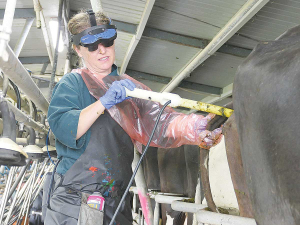Made in New Zealand is a feature that looks at the wealth of design and manufacturing ability we have in New Zealand, producing productive and cost-effective products for the agricultural sector. This week Machinery Editor Mark Daniel takes a closer look at Ultra-Scan, catching up with franchisers Glenn Chambers and Bianca Bothma.
When was the company founded, by whom and why?
Ultra-Scan was founded in 1994 by David McDonald who used the first ultrasound pregnancy testing technology for cattle imported into the country. The method of internal ultrasonic pregnancy testing increased the speed and accuracy of identifying in-calf cattle, as well as accurately dating the stage of gestation of the foetus. The ‘traditional’ method of ‘internal palpation’ using a hand was slow, did not age the foetus and was tiresome on the technician.
The ‘Seeing is Believing’ technology allowed the technician and farmers to be able to view the size and characteristics of the foetus on a stationary screen, so demand grew exponentially. Factoring in the then-prohibitive cost of an ultrasound scanner, McDonald established a franchise model with local technicians owning their own equipment. In late 2023, Ultra- Scan was purchased by Glenn and Bianca.
Where is the business located?
Ultra-Scan operates 21 franchised territories nationwide, with skilled local technicians specialising in pregnancy scanning and calf disbudding. The businesses follow strict biosecurity standards, including washing and disinfecting their equipment between each job. A national support office remains in Matamata where the company was first established.
What are the key products?
Pregnancy diagnosis in cattle, with accurate foetal ageing at 35-90 days from conception. This is complemented by 6-week in-calf scans to confirm pregnancy to artificial breeding /insemination dates, alongside detection of twins and foetal demise or abortion.
Calf disbudding is carried out, with animals kept conscious in purpose-built restraint crates. The process uses local anaesthetic and LPG burners to disbud calves from four days to ten weeks of age, with no interruption to feeding regimes. Additional services include ear tagging, spare teat removal, vaccinations, DNA testing and elastration.
Some territories also offer pre-mating scans to detect deep set infections and cysts, alongside goat and deer scanning, and disbudding.
Looking at an ever-evolving market, what changes have you made over the last few years, or what will Ultra- Scan have to do in future?
Ultra-Scan helped MPI draft regulations around the safe and comfortable calf disbudding techniques, with the introduction of compulsory anaesthetics to reduce the pain during the procedure. Scanning equipment is continuously evolving to increase accuracy and speed. The introduction of the backpack scanner and headset display in 2011, allowed scanning of rows of cattle more quickly, with greater mobility for the operator. Our scanning equipment is of the latest technology. We offer the most accurate method of foetal detection and ageing, physically seeing the foetus, which means the process is superior to any other pregnancy detection techniques such as cow collars or milk testing, which only offer assumptions of conception dates.
What has been the company’s greatest success?
Our specialisation has seen us become NZ’s largest pregnancy scanning and disbudding service provider, scanning over 660,000 cattle each year and disbudding more than 200,000 calves alongside supporting the goat and deer industries in some territories.
As a business, Ultra- Scan is still providing our two core services after more than 30 years, and we continue to grow and expand across New Zealand. Kiwi-owned and operated, our local franchisees are family and community orientated, run independently, with the support of the national office in Matamata, allowing growth and subdivision potential to acquire more loyal customers.


















